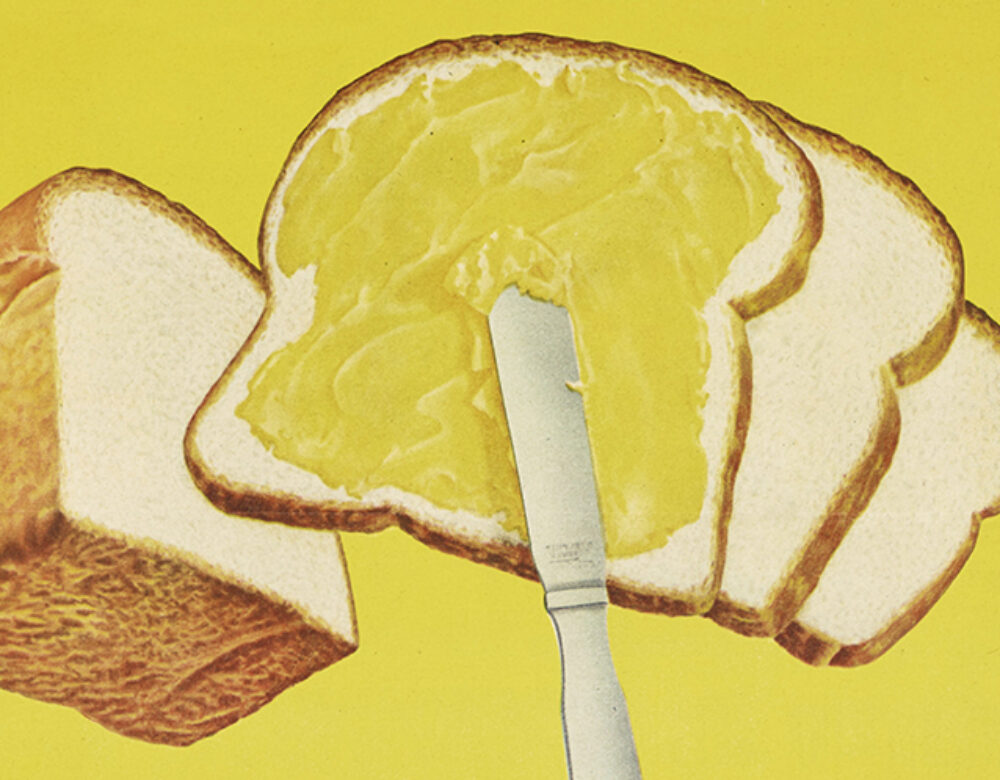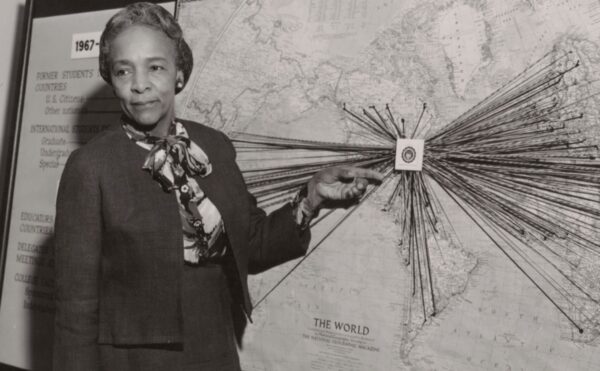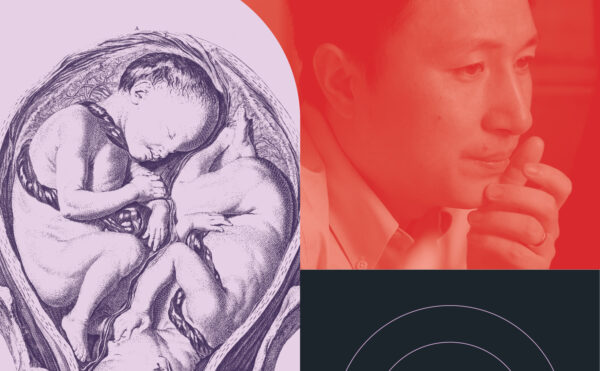It’s one of the most bizarre episodes in American food history: when butter and margarine were at war. What you choose to spread on your toast might seem like a boring subject, but it turns out to be fascinating and sometimes hilarious. Margarine’s history began with French emperor Napoleon III, a French chemist, and some sheep’s stomachs and went on to include heated courtroom debates, our first federal laws regulating food, and outlaws smuggling faux butter across state lines.
The spreads have competed for more than a hundred years, and public preferences shift each time our understanding of health science changes. In this episode of Distillations, we learn about the history of butter and margarine and explore the distinctly American debates they inspired involving food, health, science, and regulation.
Credits
Hosts: Elisabeth Berry Drago and Alexis Pedrick
Producer: Mariel Carr
Associate Producer: Rigoberto Hernandez
Audio Engineer: Catherine Girardeau
Our theme music was composed by Zach Young
Additional music courtesy of the Audio Network
Transcript
Margarine v. Butter: One of America’s most bizarre food battles
Rigoberto Hernandez >> Do you prefer Margarine or butter?
Man >> butter first and butter last.
Woman >> I use like vegan butter…yeah.
Woman >> I prefer butter and I am French. In France we eat butter. Woman >> I usually purchase Margarine because it’s cheaper.
Woman >> Between butter and margarine….sure I will choose butter. Woman >> It just tastes better.
Man >> I used to use alternative to butter until I realize that actually butter is better for you.
Man >> There’s a lower amount of processing that goes involved in the creation of it which I really appreciate.
Man >> When I was a kid my parents preferred margarine, I think, more as an economic reason. Woman >> I prefer Olive Oil. That’s the healthiest for anyone.
Introduction
Alexis Pedrick: Hello and welcome to Distillations. I’m Alexis Pedrick. I’m the manager of public programs at CHF.
Lisa Berry Drago: And I’m Lisa Berry Drago. I’m a public history fellow here.
Alexis: We’re your guest hosts! We’re here to tell you about a topic that’s near and dear to our hearts.
Lisa: That’s right. It’s almost Thanksgiving, so, of course, this episode is about food. Specifically, things you spread on toast.
Alexis: It’s one of the most bizarre episodes in American food history: when butter and margarine went to war.
Lisa: Unless you were alive and buttering your bread before 1950, or if you live in Wisconsin or Quebec, you might think that margarine is sort of a dull subject. But it turns out to have a fascinating history that began with French emperor Napoleon III, and continued with heated courtroom debates, federal laws that regulated it, and people who smuggled it across state lines.
Alexis: Lisa and I have spent a lot of time thinking and laughing about this battle that’s lasted more than a hundred years and continues today. So the kind folks at Distillations let us take over this episode. Yeah, we’ll try not to burn down everything you’ve built.
Lisa: Maybe if we’re good they’ll let us come back?
Alexis: We can hope.
CHAPTER ONE: The Early Days of Margarine
1981 Promise Margarine commercial >> There is a land of promise, a land of sun and showers, and in that land of promise, we grow our golden sunflowers…The natural goodness of sunflowers is in every bite of promise margarine…
Alexis: If you grew up in America in the 1980s like we did, there’s a good chance that you ate your fair share of margarine.
Lisa: So my mom swears she hates butter.
Alexis: What?
Lisa: She doesn’t like butter! We never kept it in the house. So what did you grow up eating?
Alexis: I grew up eating margarine, but I’ve only just now realized that. Because we just kept a giant tub of Country Crock in the fridge, and I thought that’s what butter was, and I thought real butter was weird and gross, because it was in these squares, but now as an adult it’s all becoming clear to me.
Lisa: But before there was margarine there was only butter. Or lard. But butter was expensive and it went bad pretty quickly. So in the late 1800s French emperor Napoleon III put out a call for a cheaper, more shelf-stable butter substitute to feed his troops. And he offered a prize to anyone who could create one.
That’s where French chemist Hippo—can I get some help here?
French speaker >> Hippolyte Mège-Mouriès.
Lisa: Awesome. So in 1869 that guy came up with a solution. But his early product, which he called oleomargarine, was very different from the margarine we grew up eating.
Alexis: Right. Today you might think of margarine as vegetarian, or even vegan! But this is how, (sigh)—
French speaker >> Hippolyte Mège-Mouriès.
Alexis: —made his. It’s basically witchcraft. He heated finely-minced beef fat with potassium salts and fresh sheep’s stomach and raised the temperature to 113° Fahrenheit. Now the pepsin from the sheep’s stomach combined with the heat to separate the beef fat from the cellular tissue. Then he added pressure to separate the softer oils from the stearin, mixed the resulting oil with milk, water, and annatto—that’s the yellow food coloring derived from seeds of the achiote tree, and voila! Or abracadabra! Something that looked and tasted like butter!
Lisa: Without that added yellow color it was kind of grayish, which is not all that appetizing. But that didn’t stop it from getting a U.S. patent in 1873—
Alexis: —Or for production to take off here. Because even though this new stuff wasn’t perfect, the butter that was available in the U.S. wasn’t so great either. Butter was having some quality control issues. You never really knew what you were going to get.
Lisa: Dairy farmers’ wives were in charge of making butter, and apparently some of them were better at it than others.
Alexis: Even well-made butter often went bad before it reached its final destination. In the mid 1800s Wisconsin butter had such a bad reputation in Chicago that people called it “western grease.” And stores sold it as a lubricant, not for human consumption.
Lisa: Margarine was cheaper, but it had a stigma. Partly because it was processed: it was seen as unnatural and impure. This natural vs. unnatural food debate has been going strong for over 100 years— just think of today’s anti-GMO and organic crazes.
Alexis: Still, when margarine came onto the scene the dairy industry felt threatened. Here was a product that looked and tasted like butter, but it was cheaper. Butter painted a picture of margarine as a counterfeit food alien. They said butter was pure and natural, and margarine was synthetic, unhealthy, and full of
chemicals, and essentially a fraud. Here’s a speech Wisconsin Senator Joseph Quarles gave to the U.S. senate:
Dramatization of Senator Joseph Quarles speech >> Things have come to a strange pass when the steer competes with the cow as a butter maker…We ought not now to desert her or allow her to be displaced, her sweet and wholesome product supplanted by an artificial compound of grease that may be chemically pure but has never known the fragrance of clover.
Lisa: And another mid-Westerner, Minnesota’s governor Lucius Hubbard said:
Dramatization of Governor Lucius Hubbard >> The public has been victim of various impositions practiced in different departments in its industry, but I think it will be admitted that the ingenuity of depraved human genius has culminated in the production of oleomargarine and its kindred abominations.
Lisa: Despite the negative publicity, margarine remained popular because it was cheap. But it was still a new product and it was going up against big butter, which was backed by a lot of people with political sway. And they stood to lose a lot of money.
Alexis: Farmers wrote postcards to their congressmen pleading with them to make margarine illegal.
Reading of farmer postcard >> Our soils will be depleted and become barren.
Reading of farmer postcard >> The dairy industry is doomed.
Lisa: More than 22 states passed laws that restricted the sale of margarine. New York banned margarine completely. And all of Canada banned it until 1948! Quebec just started allowing the sale of colored
margarine in 2008. In Wisconsin it’s still illegal for restaurants to serve you margarine instead of butter.
Alexis: Back in the late 19th century New Hampshire, Vermont, and South Dakota required margarine to be colored pink to make it look gross, which like, yes, that worked. The color of margarine was one of the biggest points of contention. A national dairy magazine ran an ad campaign that said, “Yellow belongs to butter.”
Lisa: But the piece-meal approach of various state regulations wasn’t working so well. It was hard to enforce the laws, and butter backers wanted more. So they started pressuring Congress to ban margarine at a federal level. Eventually one bill made it to the house floor.
Alexis: During deliberations, Representative David Henderson of Iowa gave a passionate speech.
Dramatization of David Henderson speech >> You will find butter in the Bible from Genesis to Revelations. You will hardly find a book in the Bible that does not speak of butter. Such articles of food, of all things, are entitled to kind consideration and the fullest protection from the lawmaker!
Lisa: The bill passed, and became the 1886 Oleomargarine Act. The federal law didn’t ban margarine outright, but it taxed it heavily, taking away its biggest draw: its cheapness.
Alexis: This law was actually kind of remarkable. The only other domestic products that were taxed at the time were whiskey and tobacco, and they were essentially sin taxes. And there wasn’t really any other kind of food regulation at the time.
Lisa: People who broke the law went to prison! We found mugshots in the National Archives of men who were locked up for years for selling margarine without a license. As a New York Times article reported—
Reading of New York Times article >> Christopher Strauss, grocer, of No. 16 Second Avenue, was arraigned before Justice Murray in the Fifty-Seventh Street Police Court yesterday, charged with selling oleomargarine, representing it to be pure butter. S.A. Churchill, a former manufacturer of the artificial article, and who is now employed as a detective by the Butter and Cheese Exchange, appeared as complainant.
Alexis: That’s right. The dairy industry hired detectives who investigated instances of butter fraud. Just another thorn in margarine’s side.
Lisa: Even after the 1886 federal law was overturned in 1950, Wisconsin held onto its state laws much longer, resulting in widespread margarine-smuggling. There were a lot of soggy suitcases and car trunks full of melted margarine.
CHAPTER TWO: Margarine takes the lead
Alexis: Margarine had to overcome a lot of obstacles in the 20th century, but two major turning points helped pave the way towards some sort of victory. The first was the Great Depression. Pretty bad for most people and businesses—not so bad for margarine.
Lisa: Even with a federal tax margarine was still cheaper than butter. And then World War II brought food rationing, and butter required more points. So a lot of people who didn’t like margarine before the war started eating it out of necessity.
Alexis: Margarine’s main draw had always been its price. This is a Nucoa margarine commercial from the 1950s.
Nucoa margarine ad>> Surprise yourself! Surprise yourself! Try the new flavor of new, new Nucoa! I was surprised to find a spread that costs so little taste so sweet and fresh!
Lisa: In the meantime butter tried to make its higher cost seem like a good thing. This is an American Dairy Association ad from the 1960s:
American Dairy Association ad >> Butter, real butter. Costs a little more but it’s worth a lot more! Butter, real butter, priceless flavor country fresh flavor. Pure cream goodness.
Alexis: But in the mid-20th century margarine began to seem like a healthier option—not just a cheaper one. In the 1930s margarine producers began adding synthetic vitamins to their products. So margarine could claim it was healthy.
Nucoa margarine ad >> Nucoa guarantees 15,000 units of vitamin A! The most expensive spread you buy can’t make that guarantee.
Lisa: Then in the 1960s something big happened. Something that would go on to affect us as children in the 1980s.
Advertisement >> Cholesterol
Alexis: Ancel Keys was an American physiologist who studied diet and health. In 1952 he brought his idea about diet and cholesterol to the world. It was basically: “Eat fat. Raise cholesterol. Get a heart
attack.”
Lisa: In 1961 the American Heart Association adopted his conclusion and told Americans to eat less fat if they wanted to reduce their risk of heart disease, and to replace saturated fat with polyunsaturated fat.
Alexis: And margarine producers jumped onto these new recommendations. This is a commercial for Good Luck margarine from the 1960s:
Good Luck Margarine ad >> New Good luck margarine gives you both! Preferred unsaturates and preferred flavor. Preferred unsaturated for those concerned about the family diet. Plus delicious flavor your whole family will prefer.
Alexis: The basic idea was that animal fats were bad, vegetable fats were good.
Lisa: And this was great for margarine, because it had ventured away from beef tallow—remember the witchcraft?—and had started using vegetable oils, thanks to the invention of hydrogenation.
Alexis: Hydrogenation is basically when you add hydrogen to something. Right? Actually, no. I don’t know. Let’s ask Bob.
Bob Kenworthy >> You have to increase the amount of hydrogen in the carbon-hydrogen ration of the fatty acid in order to bring the melting point up to the point where the material is a solid at room temperature. And the way you do that is to use hydrogen gas and a catalyst to react with the oil and that’s the process known as hydrogenation.
Lisa: The anti-cholesterol craze was huge for margarine. And we all grew up thinking we were saving our hearts by eating it, just like this 1981 Promise commercial, uh, you know, promised:
Promise margarine commercial >> The natural goodness of sunflowers oil is in every bite of promise margarine. Promise taste fresh and light. And sunflower oil is high in polyunsaturates and has no cholesterol…There is a land of promise, a land of golden sunflowers…
CHAPTER THREE: From Villain, to Hero, and Villain Again
Alexis: Ah, the 80s, such a naïve time.
Lisa: Margarine was able to claim it was healthy because it used partially hydrogenated vegetable oil, which contained trans fats, and were believed to be healthier than saturated, or animal fats. And in the late 1980s a lot of big food companies, including McDonalds, made this switch.
David Schleifer >> But it was actually pretty quickly afterwards, it was in 1990, that there was one paper published in the New England Journal of Medicine that argued that trans fats were riskier than saturated fats because they both raised bad cholesterol and they lowered good cholesterol.
Lisa: That’s David Schleifer. He’s the director of research at Public Agenda, a non-profit organization that does public opinion research on health care and other social issues. He’s also a former CHF fellow. And he knows a lot about trans fats.
Schleifer >> The story of trans fat is probably the most dramatic reversal, because it wasn’t just “you should eat this you shouldn’t eat that,” it was really the whole industry mobilizing to make this massive technological change, and then make another one, in pretty short order.
Alexis: Phew! Well I’m glad we finally figured out what to eat!
Lisa: Right! We finally got it! And it will never change again.
Alexis: Never! Actually, let’s listen to a clip of this funny or die video, called “Time Travel Dietician”
Dietician >> Wait! Stop! Don’t eat that food.
Woman >> Who are you? What are you doing in our house?
Dietician >> I am from the future. I am here to warn you don’t eat that food.
Man >> Why not?
Dietician >> The eggs, they’re full of cholesterol.
Woman >> What?
Dietician >> Cholesterol, it clogs up your arteries. Woman >> Well, I guess I better take those eggs. Dietician >> Wait! Stop!
Woman >> You’re back.
Dietician >> yeah, we were wrong about the eggs. Turns out that the amount of cholesterol doesn’t actually affect how much cholesterol ends up in your blood. The eggs are probably fine. In fact we sort of don’t even know what cholesterol is. But the steak, you can’t eat the steak!
Lisa: Okay! So we’re in trouble. Now everyone’s freaked out about trans fats and all these trendy people want to eat like our Paleo ancestors. But what will science tell us next?
Alexis: Who knows? But right now, butter is having a moment. In 2015 McDonald’s’ in the United States reported an almost one percent increase in their sales which they partially attribute to using butter instead of margarine in their egg McMuffins. And France is experiencing a butter shortage right now, partly due to higher demand in the U.S.
CONCLUSION
Lisa: It’s hard to imagine so much fuss being made over something as mundane as margarine. But the margarine/butter battle set the stage for many more debates involving food, health, and science in a distinctly American way.
Alexis: And science has been inextricably linked to these spreads throughout their history, from the chemistry involved in the creation of margarine, to the way it was used to back up arguments for and against it, to our modern understandings of whether or not butter and margarine are even good for us.
Lisa: so Alexis, what did you find most interesting in researching this story?
Alexis: I think I’m fascinated by how desperate we are for a definitive answer and how that leads us to constantly swing from one extreme to the other every 10 to 50 years. And it would be a lot easier if we just had more nuance about the situation. Like butter has great qualities, and margarine has great qualities, and everything in moderation. We’ll be fine. What about you? What do you have in your fridge? Do you have butter or margarine?
Lisa: We are a butter house. We are a butter family. And I don’t see that changing no matter what studies come out, or what new research that says butter will make our heads explode. We’re probably going to stick with butter.
Alexis: All right. That’s fair.
Alexis: Distillations is more than a podcast. We’re also a multimedia magazine.
Lisa: You can find our videos, our blog, and our print stories at Distillations.org.
Alexis: And you can also follow the Chemical Heritage Foundation on Facebook, Twitter, and Instagram.
Lisa: This episode was produced by Mariel Carr and Rigo Hernandez.
Alexis: And it was mixed by Catherine Girardeau.
Lisa: Our theme music was composed by Zach Young. For Distillations I’m Lisa Berry Drago.
Alexis: And I’m Alexis Pedrick.
Alexis and Lisa: Thanks for listening!
Alexis and Lisa: Butter! Butter butter butter butter. Butter! Butter butter butter butter.
Lisa: One smear at a time, the butter of our lives.
Alexis: A whole new butter!
Lisa: It’s called margarine it’s pink. It’s made from sheep!
Alexis: It’s produced witchcraft you can see!
Lisa: They called it oleo-something
Alexis: It’s margarine! But no one still believes.
Alexis: I would like to see a remake of The Wire, featuring only margarine crimes.
Lisa: Only margarine crimes!
Alexis: Netflix!? Are you listening? This is my pitch to you.
Lisa: What is it gonna be called? The Tub!
Alexis: Yes! Yes!
Lisa: The Tub.
Alexis: Or like, it could be another Law and Order. Like, Law and Order: Margarine Crimes. These are the crimes that define our sting. So many shows could be improved by just covering these margarine crimes.
Lisa: Yeah, I completely agree.






